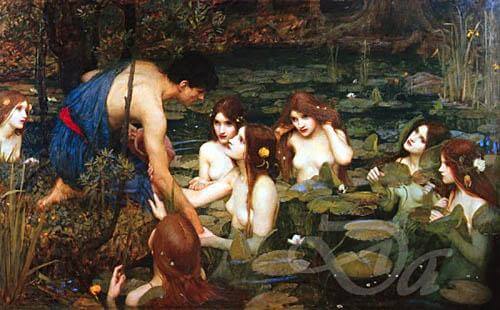Nereids
The Nereids were fifty goddesses of the sea, daughters of Nereus (eldest son of Pontus, the Sea and Gaia, the Earth) and Doris (an Oceanid and Sea Nymph). They were sisters of Nerites (a young minor sea god).
They Nereids were the patrons of sailors and fishermen, who came to the aid of men in distress.
Individually they also represented various facets of the sea, from salty brine, to foam, sand, rocky shores, waves and currents, in addition to the various skills possessed by seamen.
They often accompany Poseidon, the god of the sea, and can be friendly and helpful to sailors fighting perilous storms.
The Nereids were depicted in ancient art as beautiful young maidens, sometimes running with small dolphins or fish in their hands, or else riding on the back of dolphins, hippokampoi (fish-tailed horses) and other sea creatures.
The Nereids were different to the Sirens as those creatures we call Mermaids are, speaking properly, Nereids (fish shaped women) and not Sirens (women with bird forms).
Sirens, Nereids and Mermaids
The Nereids of Greek mythology gave rise to the tales of the mermaids that were so popular among later sailors' mythology. These sea nymphs were given the features traditionally associated with the mermaid, half beautiful woman, half fish.
These enchanting creatures were well known to mingle with humans and to bear children.
As to the Sirens, originally, there were only three sirens who, after being pounished, would be shaped as birds.
The Sirens were handmaidens of Persephone, daughter of the goddess Demeter
It is said that when Persephone was abducted by Hades, Demeter gifted the three girls with the bodies of birds so they could help search for the lost girl.
When they couldn't find her they eventually gave up and went to live on the island of Anthemoessa, cursed by Demeter (who was angry at their abandonment of the search) to remain in their half-bird form.
The Sirens were further cursed when they entered a singing competition with the Muses and lost the contest as well as their wings and many of their feathers.
Eventually, the sirens died with the fulfillment of a prophecy that should anyone be able to resist their song, the sirens would perish.
And they did; when Odysseus had his men block their ears and then tied himself to the mast of his ship so he could listen but not interfere, the sirens hurled themselves into the sea and died as he passed.
Poseidon and Amphitrite
One of the most well known mythological couples in which a sea- goddess related to the Nereids was involved, was that of Poseidon and Amphitrite.
Amphitrite was a sea-goddess, daughter of Doris and Nereus and therefore sister of the Nereids. She might be also considered one of the Fifty Nereids (Sea-Nymphs), according to other sources.
Poseidon (Roman Equivalent: Neptune) was the God of the Sea and he was also referred to as "Earth-Shaker" due to his role in causing earthquakes. According to the references from Plato in his dialogues "Timaeus" and "Critias", the island of Atlantis was the chosen domain of Poseidon.
The Nereids names are (keep in mind the list, of names, is correlated from various sources like: Homer's Iliad, Hesiod's Theogony, Hyginus etc. Because of this the total number of names goes beyond fifty):
Homer's Iliad:
There were Glauce and Thaleia and Cymodoce, Nesaea and Speio and Thoe and ox-eyed Halie, and Cymothoe and Actaea and Limnoreia, and Melite and Iaera and Amphithoe and Agave, Doto and Proto and Pherousa and Dynamene, and Dexamene and Amphinone and Callianeira, Doris and Pynope and glorious Galatea, Nemertes and Apseudes and Callianassa, and there were Clymene and Ianeira and Ianassa, Maera and Orithyia and fair-tressed Amatheia, and other Nereids that were in the deep of the sea.
Hesiod's Theogony
And of Nereus and rich-haired Doris, daughter of Ocean the perfect river, were born children, passing lovely amongst goddesses, Ploto, Eucrante, Sao, and Amphitrite, and Eudora, and Thetis, Galene and Glauce, Cymothoe, Speo, Thoe and lovely Halie, and Pasithea, and Erato, and rosy-armed Eunice, and gracious Melite, and Eulimene, and Agaue, Doto, Proto, Pherusa, and Dynamene, and Nisaea, and Actaea, and Protomedea, Doris, Panopea, and comely Galatea, and lovely Hippothoe, and rosy-armed Hipponoe, and Cymodoce who with Cymatolege and Amphitrite easily calms the waves upon the misty sea and the blasts of raging winds, and Cymo, and Eione, and rich-crowned Alimede, and Glauconome, fond of laughter, and Pontoporea, Leagore, Euagore, and Laomedea, and Polynoe, and Autonoe, and Lysianassa, and Euarne, lovely of shape and without blemish of form, and Psamathe of charming figure and divine Menippe, Neso, Eupompe, Themisto, Pronoe, and Nemertes who has the nature of her deathless father.
Apollodorus' Library
To Nereus and Doris were born the Nereids,whose names are Cymothoe, Spio, Glauconome, Nausithoe, Halie, Erato, Sao, Amphitrite, Eunice, Thetis, Eulimene, Agave, Eudore, Doto, Pherusa, Galatea, Actaea, Pontomedusa, Hippothoe, Lysianassa, Cymo, Eione, Halimede, Plexaure, Eucrante, Proto, Calypso, Panope, Cranto, Neomeris, Hipponoe, Ianira, Polynome, Autonoe, Melite, Dione, Nesaea, Dero, Evagore, Psamathe, Eumolpe, Ione, Dynamene, Ceto, and Limnoria.
Hyginus in his Fabulae
From Nereus and Doris fifty Nereids: Glauce, Thalia, Cymodoce, Nesaea, Spio, Thoe, Cymothoe, Actaea, Limnoria, Melite, Iaera, Amphithoe, Agaue, Doto, Proto, Pherusa, Dynamene, Dexamene, Amphnome, Callianassa, Doris, Panope, Galatea, Nemertes, Apseudes, Clymene, Ianira, [Panopea], Ianassa, Maera, Orithyia, Amathia, Drymo, Xantho, Ligea, Phyllodoce, Cydippe, Lycorias, Cleio, Beroe, Ephyre, Opis, Asia, Deiopea, Arethusa, Creneis, Eurydice, Leucothea.
[1] and [2]













